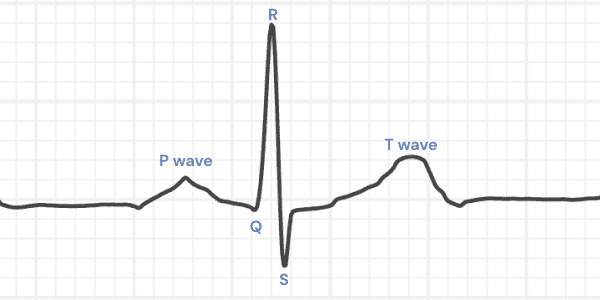
An electrocardiogram, commonly known as an EKG or ECG, is a non-invasive medical test that records the electrical activity of your heart.1 An EKG is a simple yet powerful tool that can help your doctor detect a wide range of cardiac abnormalities, from irregular heart rhythms to evidence of a heart attack.2
Each time your heart beats, an electrical impulse travels through its chambers, causing the muscle to contract and pump blood throughout your body. An EKG captures these electrical signals and displays them as a series of waves on a moving strip of paper or a digital screen. By analyzing the pattern, size, and duration of these waves, a doctor can gain crucial insights into the heart's function and identify potential issues.1
How does an EKG work?

An EKG is characterized by a series of distinct waves, each corresponding to a specific electrical event in the heart.
- P Wave: This first small, upward wave represents the electrical impulse spreading through the atria, the two upper chambers of the heart, causing them to contract.1,3,4
- QRS Complex: Think of this as the main event of your heartbeat. It's the large, sharp spike you see on an EKG. This spike shows the powerful squeeze of the two lower chambers of your heart, called the ventricles. This is the strongest part of the heartbeat because it's what pushes blood out to your lungs and the rest of your body.1,3,4
- T Wave: This smaller wave comes right after the big spike. It shows the lower chambers of your heart relaxing and recharging after their big squeeze. It’s like a reset button, getting the heart ready for the very next beat.1,3,4
The analysis of the intervals between these waves, their shape, and their consistency is crucial for a physician to assess the heart's rate, rhythm, and overall health.
When should you take an EKG?
Your doctor may recommend an EKG for various reasons, including the investigation of symptoms that could indicate a heart problem. These symptoms often include2:
- Chest pain
- Heart palpitations (a feeling of a racing, pounding, or fluttering heart)
- Shortness of breath
- Dizziness or fainting
- Rapid pulse
- Weakness or fatigue
EKGs are also used to monitor the health of individuals with known heart conditions, to assess the effectiveness of treatments like pacemakers or medications, and as part of a routine check-up to screen for potential heart disease, especially in individuals with risk factors such as high blood pressure, high cholesterol, smoking, diabetes, or a family history of heart disease.5
Heart rate, pulse, and rhythm: What's the difference?
While often used interchangeably, heart rate, pulse, and rhythm refer to distinct aspects of your heart's function, all of which are measured by an EKG:
- Heart Rate: This is the number of times your heart beats per minute (bpm).6
- Pulse: This is the physical manifestation of your heart rate that you can feel at various points on your body, such as your wrist or neck.6
- Heart Rhythm: This refers to the pattern of your heartbeats. A normal rhythm is steady and consistent. An irregular rhythm, known as an arrhythmia, can be too slow (bradycardia), too fast (tachycardia), or in an inconsistent pattern.7
An EKG provides a visual representation of both the rate and the rhythm of the heart, allowing a physician to make a thorough assessment of its electrical health.
In-Hospital vs. At-Home EKGs
The most comprehensive type of EKG is the 12-lead EKG, typically performed in a hospital or clinic setting. This test uses 10 to 12 small, sticky electrodes placed on the chest, arms, and legs. These electrodes capture the heart's electrical activity from 12 different angles, providing a detailed, three-dimensional view of the heart. This level of detail is essential for accurately diagnosing complex heart conditions.1,2
Outside the hospital, you may also choose to use a personal EKG, like Kardia. These portable, often handheld devices make it possible to record an EKG from anywhere and at any time—like when you’re experiencing one of the symptoms mentioned earlier. Personal EKGs typically record fewer leads than an in-hospital EKG (usually a single- or 6-lead), but are still highly effective at detecting rhythm abnormalities like atrial fibrillation (AFib). Personal EKGs offer a convenient way to monitor your heart proactively and share important data with your doctor remotely.
Talk with your doctor about your heart health and determine if a personal EKG is right for you. Learn more about personal EKGs like Kardia today.
Kardia personal EKGs do not check for heart attack and do not replace regular health checkups with your physician. Seek medical attention if you are experiencing any concerning symptoms or if you are having an emergency.
1. https://www.ncbi.nlm.nih.gov/books/NBK536878/
2. https://www.mayoclinic.org/tests-procedures/ekg/about/pac-20384983
3. https://www.ncbi.nlm.nih.gov/books/NBK549803/
4. https://my.clevelandclinic.org/health/diagnostics/16953-electrocardiogram-ekg
5. https://www.hopkinsmedicine.org/health/treatment-tests-and-therapies/electrocardiogram
6. https://my.clevelandclinic.org/health/diagnostics/heart-rate
7. https://www.mayoclinic.org/diseases-conditions/heart-arrhythmia/symptoms-causes/syc-20350668












